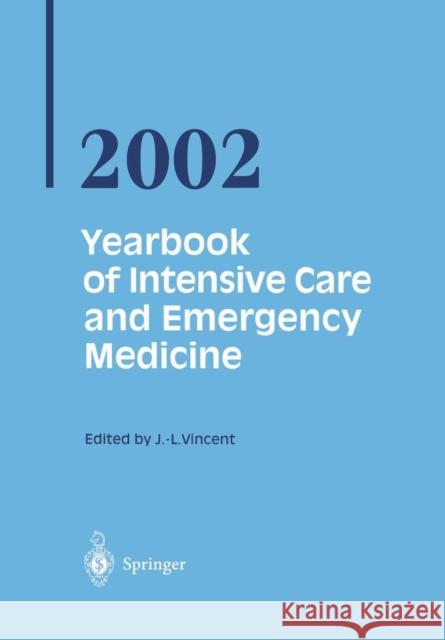Yearbook of Intensive Care and Emergency Medicine 2002 » książka



Yearbook of Intensive Care and Emergency Medicine 2002
ISBN-13: 9783540431497 / Angielski / Miękka / 2002 / 968 str.
With chapters from specialists in the field of intensive care and emergency medicine, this volume compiles developments in experimental and clinical research and practice in one comprehensive reference book for 2002.
Cellular Responses.- Ischemia-reperfusion and Acute Apoptotic Cell Death.- Alpha-4 Integrin: A Novel Mechanism for Neutrophil-endothelial Interaction.- Cell Adhesion Molecules and Leukocyte Trafficking in Sepsis.- Molecular Mechanisms of Complement Activation during Ischemia and Reperfusion.- Gender and Cell-mediated Immunity following Trauma, Shock, and Sepsis.- Bask Mechanisms in Acute Respiratory Failure.- Regulatory Role of Alveolar Macrophages and Cytokines in Pulmonary Host Defense.- Apoptosis in Pneumonia.- Hypoxic Pulmonary Vasoconstriction and the Pulmonary Microcirculation.- Pulmonary Endothelial Angiotensin Converting Enzyme Activity in Lung Injury.- Modulating Host Response.- Antioxidants and Endothelial Function: Therapeutic Implications.- Pentoxifylline: A Useful Adjuvant in the Critically Ill?.- High Volume Hemofiltration in Sepsis.- Adjuvant Treatment of Mediastinitis with Immunoglobulins after Cardiac Surgery: The ATMI Trial.- The Immunomodulatory Effects of Anesthetic and Analgesic Agents.- Myocardial Responses.- Myocardial Ischemia-reperfusion Injury: Role of the Peroxynitrite-poly(ADP-ribose) Polymerase Pathway.- Effects of Anesthetics on Ischemia-reperfusion Injury of the Heart.- Regulatory Role of Nitric Oxide in the Heart of the Critically Ill Patient.- TNF as a Mediator of Cardiac Depression following Snakebite.- Acute Right Ventricular Failure: Physiology and Therapy.- Cardiovascular Management.- The Rationale for Vasodilator Therapy in Sepsis.- Vasopressin and its Analogs.- Mechanical Ventilation.- The Use of Ventilatory Modes allowing Spontaneous Breathing during Mechanical Ventilation.- Neural Control of Mechanical Ventilation: A New Approach to Improve Patient-Ventilator Interaction.- Assisting Ventilation by Pressure Support: More than a Weaning Tool.- Conditioning of Inspired Gases in Mechanically Ventilated Patients.- Bronchodilator Therapy in Mechanically Ventilated Patients.- Management of Acute Respiratory Failure.- Titrating Optimal PEEP at the Bedside.- Effect of PEEP and Targets During Mechanical Ventilation in ARDS.- Lung Recruitment in Localized Lung Injury.- Advances in ARDS: How do they Impact Bedside Management?.- Non-invasive Mechanical Ventilation.- Methodology of Non-invasive Mechanical Ventilation in Acute Respiratory Failure.- Non-invasive Mechanical Ventilation and Prevention of Pneumonia in Patients with Acute Respiratory Failure.- Infectious Challenges.- Evaluation of Non-responding Patients with Ventilator-associated Pneumonia.- The Prevention of Invasive Candida Infection in Critically Ill Surgical Patients.- Bacterial CpG DNA in Septic Shock.- Antibiotics by Continuous Infusion: Time for Re-evaluation?.- Extended Spectrum Beta-lactamases in Gram-negative Sepsis.- Fluid Therapy.- Towards Safer Central Venous Access.- Strong Ions, Acid-base, and Crystalloid Design.- Reactive Oxygen Species as Mediators of Organ Dysfunction: Potential Benefits of Resuscitation with Ringer’s Ethyl Pyruvate Solution.- The Immunological Effects of Hypertonic Saline.- Does Albumin Infusion Affect Survival? Review of Meta-analytic Findings.- Metabolie Support.- Lipids in Parenteral Nutrition: Benefits in Critically Ill Patients?.- Early Enteral Nutrition in the Intensive Care Unit.- Relative Adrenal Insufficiency Syndrome.- Metabolic Effects of Adrenergic Drugs.- Acidemia: Good, Bad, or Inconsequential?.- Cardiorespiratory Monitoring.- Monitoring Left Heart Performance in the Critically Ill.- Functional Hemodynamic Monitoring: Applied Physiology at the Bedside.- Detection of Fluid Responsiveness.- Volumetric Capnography in the Non-intubated Critically Ill Patient.- Assessment of Lung Function in Mechanically Ventilated Patients.- Tissue Lactate Concentrations in Critical Illness.- Oxygen Delivery.- Oxygen Delivery and the Critically Ill.- Monitoring Intensive Care Patients.- Gastric Mucosal Tonometry in Daily ICU Practice.- Coagulopathies.- Thrombotic Microangiopathies.- Pro-hemostatic Therapy for Prevention and Treatment of Bleeding.- Coagulopathy in Trauma Patients.- Head Trauma.- Traumatic Brain Injury: Severity and Outcome.- Biochemical and Molecular Mechanisms after Severe Traumatic Brain Injury in Children.- Monitoring of Intracranial Pressure and Cerebral Compliance.- The MRC CRASH Trial.- Neurological Challenges.- Assessing Consciousness in Critically Ill Patients.- The Brain in Post-anoxic Coma: Predicting Outcome.- The Rationale for Human Selective Brain Cooling.- Septic Encephalopathy.- Critical Care Management of Refractory Status Epilepticus.- Neurocognitive Impairment in Survivors of ARDS.- Abdominal Crises.- Immunomodulatory Treatment of Severe Acute Pancreatitis.- Abdominal Perfusion Pressure as a Prognostic Marker in Intra-abdominal Hypertension.- Intra-abdominal Pressure and Chest Wall Interaction.- Renal Failure.- The Kidney in Sepsis.- Hepatorenal Failure.- Acute Renal Failure in the Critically Ill Patient: Is there a Magic Bullet?.- Particular Aspects.- Perioperative Management of the Severely Burned Patient.- Hypertensive Crises.- Cardiac Arrest in Children.- The Etiology of Obstetric Critical Illness.- Severity of Illness.- Measuring Organ Dysfunction.- Severity of Illness Scoring Systems.- Quality of Care.- Discharging the Critically Ill Patient.- Patient Examination in the Intensive Care Unit.- Are Autopsies still Useful in the Intensive Care Unit?.
1997-2026 DolnySlask.com Agencja Internetowa
KrainaKsiazek.PL - Księgarnia Internetowa









